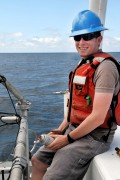Staff Profile
Jesse McNichol
Preferred Name: Jesse Mcnichol
GUEST INVESTIGATOR
BIOLOGY
Email: jcmcnichol@gmail.com
Phone: 508 289 3630
Office: BGC, 2ND FLR
Address:
Woods Hole Oceanographic Institution,
Mail Stop 52
266 Woods Hole Road
Woods Hole, MA 02543
Lab/Group Site: http://www.whoi.edu/page.do?pid=18956
Education
2003-2008
- B.Sc. in Biology, First-class Honours with Distinction, minor in Chinese Studies. Mount Allison University (Sackville, NB, Canada) and Zhejiang University (Hangzhou, China)
- Thesis: Endophytic fungi of liverworts (Bryophyta) in a copper-contaminated environment
2011-present
- Ph.D. student, MIT/WHOI Joint Program in Biological Oceanography
Research Statement
I have always been interested in ecology and the evolution of life on Earth and this passion led me to Mount Allison University for my bachelor of science, where I studied microbiology, ecology, paleontology, and molecular biology. There, I became captivated by research on hydrothermal vent ecosystems, where chemolithoautotrophic microbes – those that use only reduced inorganic chemicals to drive their growth – dominate like nowhere else on earth.
I am fortunate to have been admitted to the MIT/WHOI Joint Program in Biological Oceanography where I work with Dr. Stefan Sievert to study chemolithoautotrophs both in the lab and in the natural environment. We are currently working to culture a bacterium isolated from salt marsh sediments (Sulfurimonas denitrificans) that is a close analogue to similar organisms that exist at deep-sea hydrothermal vents. This organism is able to thrive in a dynamic chemical environment, and we are trying to understand how this organism adapts to changing conditions by measuring the expression of genes under different growth conditions using RT-qPCR.
In winter 2014, I took part in a cruise to a hydrothermal vent field in the Pacific, the East Pacific Rise at 9°N, where we did research to undererstand the role of microorganisms in the natural environment of the deep sea. We took fluid samples containing microbes at diffuse-flow vents (2.5km below the surface), returned them to our research vessel still under pressure, and incubated them under simulated natural conditions. We will investigate which organisms grow by single cell genomics and nanoSIMS, which measures the activity of individual microbes by imaging how much of a labeled substrate is incorporated into each cell. This research will give us a much broader picture of the ecology of hydrothermal vents, and may allow us to make conclusions about their importance in the ocean as a whole.
For more information about this cruse, as well as to find videos and pictures of the deep sea, see:
http://www.divediscover.whoi.edu/expedition15/
Research Interests
- Microbially-mediated elemental cycling and how this has contributed to biosphere evolution, mass extinctions and climate change
- Evolution, physiology and biochemistry of chemoautotrophic bacteria/archea
- Extremophiles, prebiotic chemistry, origin of life research
Awards
See CV
